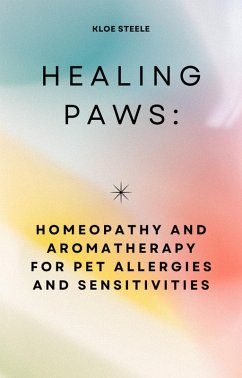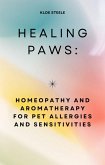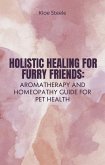Homeopathic remedies are highly diluted substances used primarily for self care, which may result in fewer side effects compared to conventional medications. This can be advantageous for pets, especially those sensitive to traditional treatments.Some homeopathic remedies are believed to support the immune system, potentially helping the body better cope with allergens and reducing the severity of allergic reactions. Here are some tips on pet aromatherapy-
Aromatherapy for Pet Allergies:
Stress Reduction: Aromatherapy, using pet-safe essential oils, may help reduce stress and anxiety in pets. Stress can exacerbate allergic reactions, so calming scents may contribute to overall well-being.
Anti-inflammatory Effects: Certain essential oils have anti-inflammatory properties, which may assist in soothing irritated skin and respiratory symptoms associated with allergies.
Respiratory Support: Aromatherapy oils like eucalyptus or peppermint, when used cautiously and in moderation, may help alleviate respiratory discomfort associated with allergies.
Natural Repellents: Some essential oils have natural insect-repelling properties. By keeping pests at bay, pet owners may help prevent allergic reactions caused by insect bites.
Improved Sleep: Calming aromas such as lavender may contribute to better sleep quality, aiding in overall health and resilience against allergy triggers.
It's important to approach both homeopathy and aromatherapy with caution, ensuring that any treatments used are safe for pets and administered under the guidance of a qualified veterinarian. Additionally, what works for one pet may not work for another, so individualized attention is key. Regular veterinary check-ups are crucial to monitor the pet's health and adjust treatment plans accordingly.
Aromatherapy for Pet Allergies:
Stress Reduction: Aromatherapy, using pet-safe essential oils, may help reduce stress and anxiety in pets. Stress can exacerbate allergic reactions, so calming scents may contribute to overall well-being.
Anti-inflammatory Effects: Certain essential oils have anti-inflammatory properties, which may assist in soothing irritated skin and respiratory symptoms associated with allergies.
Respiratory Support: Aromatherapy oils like eucalyptus or peppermint, when used cautiously and in moderation, may help alleviate respiratory discomfort associated with allergies.
Natural Repellents: Some essential oils have natural insect-repelling properties. By keeping pests at bay, pet owners may help prevent allergic reactions caused by insect bites.
Improved Sleep: Calming aromas such as lavender may contribute to better sleep quality, aiding in overall health and resilience against allergy triggers.
It's important to approach both homeopathy and aromatherapy with caution, ensuring that any treatments used are safe for pets and administered under the guidance of a qualified veterinarian. Additionally, what works for one pet may not work for another, so individualized attention is key. Regular veterinary check-ups are crucial to monitor the pet's health and adjust treatment plans accordingly.
Aromatherapy for Pet Allergies:
Stress Reduction: Aromatherapy, using pet-safe essential oils, may help reduce stress and anxiety in pets. Stress can exacerbate allergic reactions, so calming scents may contribute to overall well-being.
Anti-inflammatory Effects: Certain essential oils have anti-inflammatory properties, which may assist in soothing irritated skin and respiratory symptoms associated with allergies.
Respiratory Support: Aromatherapy oils like eucalyptus or peppermint, when used cautiously and in moderation, may help alleviate respiratory discomfort associated with allergies.
Natural Repellents: Some essential oils have natural insect-repelling properties. By keeping pests at bay, pet owners may help prevent allergic reactions caused by insect bites.
Improved Sleep: Calming aromas such as lavender may contribute to better sleep quality, aiding in overall health and resilience against allergy triggers.
It's important to approach both homeopathy and aromatherapy with caution, ensuring that any treatments used are safe for pets and administered under the guidance of a qualified veterinarian. Additionally, what works for one pet may not work for another, so individualized attention is key. Regular veterinary check-ups are crucial to monitor the pet's health and adjust treatment plans accordingly.
Aromatherapy for Pet Allergies:
Stress Reduction: Aromatherapy, using pet-safe essential oils, may help reduce stress and anxiety in pets. Stress can exacerbate allergic reactions, so calming scents may contribute to overall well-being.
Anti-inflammatory Effects: Certain essential oils have anti-inflammatory properties, which may assist in soothing irritated skin and respiratory symptoms associated with allergies.
Respiratory Support: Aromatherapy oils like eucalyptus or peppermint, when used cautiously and in moderation, may help alleviate respiratory discomfort associated with allergies.
Natural Repellents: Some essential oils have natural insect-repelling properties. By keeping pests at bay, pet owners may help prevent allergic reactions caused by insect bites.
Improved Sleep: Calming aromas such as lavender may contribute to better sleep quality, aiding in overall health and resilience against allergy triggers.
It's important to approach both homeopathy and aromatherapy with caution, ensuring that any treatments used are safe for pets and administered under the guidance of a qualified veterinarian. Additionally, what works for one pet may not work for another, so individualized attention is key. Regular veterinary check-ups are crucial to monitor the pet's health and adjust treatment plans accordingly.
Dieser Download kann aus rechtlichen Gründen nur mit Rechnungsadresse in A, B, CY, CZ, D, DK, EW, E, FIN, F, GR, H, IRL, I, LT, L, LR, M, NL, PL, P, R, S, SLO, SK ausgeliefert werden.









